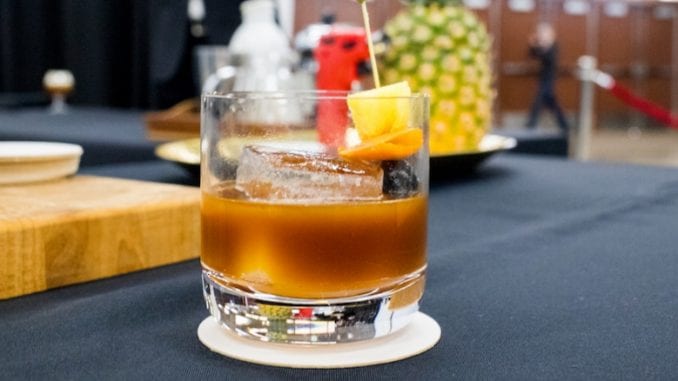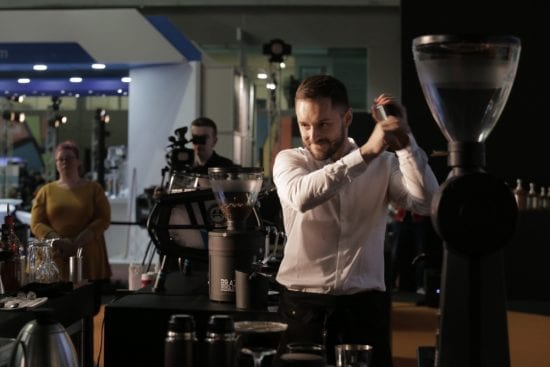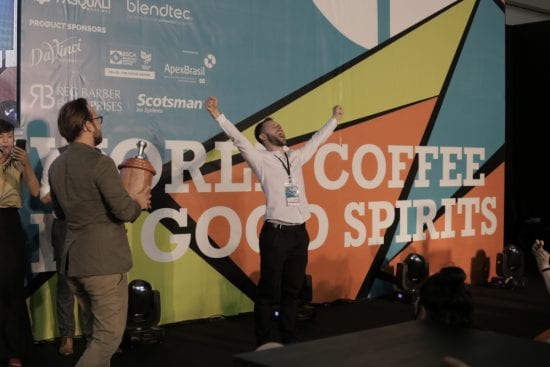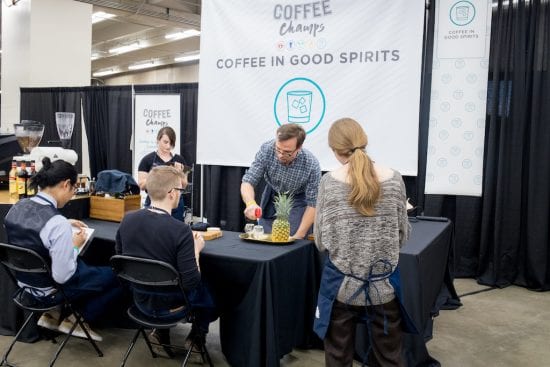
Learn more about the Coffee in Good Spirits Championship—a competition that challenges baristas to make delicious coffee + alcohol beverages.
BY CHRIS RYAN
BARISTA MAGAZINE ONLINE
Cover photo by Honor Forte
Since 2005, the World Coffee in Good Spirits Championship has challenged competitors to make delicious beverages combining coffee and alcohol. In a new series on Barista Magazine Online, we get to know the competition and talk to some of the organizers, champions, and others who have helped bring it to life.
As coffeehouses have evolved in the United States in recent years, so too have the offerings on many cafés’ menus. Drink experimentation has become a frequent occurrence, and oftentimes, these forays into new flavors include creative combinations of coffee and alcohol. For coffee businesses, this development is not just for the sake of finding new flavors—having cocktails on the café menu also opens up new revenue possibilities, of course, particularly in the afternoon time when coffee sales may slow.
Coffee and cocktails are a sensible pairing, and now the U.S. CoffeeChampionships is asking competitors to prove their mettle in this arena with a brand-new competition for the 2018-19 season: U.S. Coffee in Good Spirits, also known as CIGS.

The U.S. CIGS competition debuted at the first U.S. CoffeeChamps qualifying event in Denver in December, and it will be one of the events included in the next qualifier, taking place Jan. 12-13 in Nashville, Tenn. Qualifying competitors will then participate in the U.S. Coffee in Good Spirits Championship, occurring at the U.S. Coffee Championships in Kansas City, Mo., March 15-17.
While CIGS is new to the United States, the competition has a long history on the global level. In honor of the competition expanding its presence and debuting in the U.S., we’re taking a closer look at its history, its impact on competitors, and much more in a new series called “A Spirited Competition.” In this first installment, we answer some basic questions about CIGS.
How did the competition start?
The Specialty Coffee Association of Europe (SCAE) created Coffee in Good Spirits in 2005 as a way to expand its roster of competitions, which at the time included only the World Barista Championship and the Cup Tasters Championship. Sonja Grant, who helped found many coffee competitions, says the organizers wanted CIGS to be both professional and fun as it connected baristas to bartending.
Sonja adds that another intention of the competition was to preserve the Irish Coffee, one of the world’s oldest cocktails, which some felt was changing too much from its original, simple recipe. “The recipe was starting to be washed out by all kinds of weird creations around Irish Coffee,” says Sonja. “The Coffee in Good Spirits Championship was created to save the original recipe of Irish Coffee.” This goal is still honored in the rules of the World CIGS Championship, which require baristas to make two Irish Coffees and two designer cocktails in the final round.

In 2011, World Coffee Events took over ownership of the Coffee in Good Spirits Championship from SCAE, helping the competition reach a wider audience of coffee professionals. While competitors from Australia, Asia, and Latin America now regularly compete in the World CIGS Championship, the competition’s European roots are still strong: In the 2018 World CIGS Championship, 12 of the 22 competitors hailed from Europe.
Why did it take so long for CIGS to come to the U.S.?
While the United States has expanded its roster of competitions beyond the Barista Championship to include the Brewers Cup, Cup Tasters, and Roasters Championships in recent years, CIGS was absent from this list until the current competition season.
The reason for this—according to Carllee Curran, national competitions manager of the SCA—is U.S. liquor laws, which vary drastically state by state, presenting logistical hurdles as U.S. CoffeeChamps competitions move around the country each season. There was another complication, Carllee says: “Additionally, CoffeeChamps and USCC have always been accessible to all ages, so we needed to be certain that we could strictly observe the 21+ and distribution laws.”

Despite these challenges, Carllee says, there were many requests from the U.S. competition community to bring CIGS stateside, and so the U.S. Competitions Working Group sought to resolve the issues. Eventually, she says, they were able to understand each state’s liquor laws well enough to follow them closely, and CIGS could debut in the U.S. “It’s a process and it takes time, but we feel it’s well worth it to bring this exciting competition to the U.S.,” she says.
How does the competition work?
Unlike the World CIGS Championship that requires competitors to make Irish Coffees, the rules for U.S. CIGS are simpler. Competitors have 10 minutes to make four signature drinks—two identical hot/warm coffee- and alcohol-based drinks, and two identical cold coffee- and alcohol-based drinks. The coffee used in the drinks must be brewed during the performance time, and either the hot/warm or cold drinks must contain vodka.
Rita Kaminsky, U.S. CIGS committee chair and head judge, says the competition allows participants to create delicious, creative drinks while presenting their beverage knowledge, hospitality skills, and more. “The judges are looking for such things as: quality ingredients, balance, creativity, and professionalism,” she says. “It’s a well-rounded competition for someone in the specialty-beverage industry and opens new doors towards innovation and collaboration.”
At the first CIGS qualifier in Denver, Sam Schroeder of Olympia Coffee Roasting won first place, building cocktails around two coffee varieties from one of Olympia Coffee’s longest-term producer partners, Juan Diego de la Cerda of El Socorro in Palencia, Guatemala.
As more and more competing baristas begin to engage with Coffee in Good Spirits in the coming weeks, months, and years, we’re sure to see many exciting creations exploring the endless flavor combinations of coffee and alcohol.

